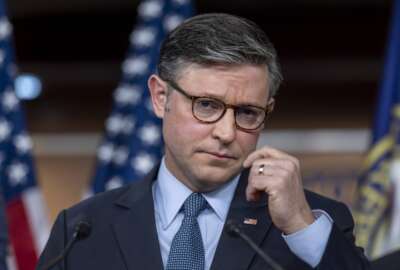DHS’s lack of financial clarity a huge liability
The Homeland Security Department\'s chief management officer said Tuesday that the lack of a departmentwide financial management system is a huge deficiency. Fixing...
wfedstaff | June 3, 2015 11:20 pm
By Jared Serbu
Reporter
Federal News Radio
The Department of Homeland Security’s chief management officer told Congress Wednesday that getting departmentwide financial management systems in place is among his biggest priorities, and not having them in place now is a huge liability.
Rafael Borras, who has been serving since March 2010 as DHS’ undersecretary for management under a recess appointment, testified before the Senate Committee on Homeland Security and Governmental Affairs Wednesday for his second confirmation hearing in a year. His previous nomination died on the Senate floor when a member placed a hold on his confirmation.
Borras said DHS simply doesn’t have financial systems that let them retrieve information quickly or reliably, or be sure that the information stored in their systems is accurate.
“The first memorandum that I signed as undersecretary last year was to do a data call, that is to do a manual retrieval of information to be able to report,” he said. “I had to give the components 60 days to collect the information, 30 days to analyze it, and then hopefully in the next 30 days after that, we’d know enough about what we were going to report on. It’s a major deficiency. It’s a major liability that I’m absolutely committed to addressing.”
As examples, Borras said the department has no centralized system for keeping track of the grants it is in charge of issuing, including how much of that funding is obligated and how much is available. And the Coast Guard, he said, has two separate general ledger systems that cannot communicate with each other.
DHS has tried twice to award contracts to consolidate its multiple financial management systems, but has yet to be successful.
“It’s going to take time to build that capacity in the Department of Homeland Security,” he said. “We’re investigating ways in which we can build some work-arounds, but one of the concerns we all have is, what’s the integrity of the data that’s in the systems right now?”
The latest independent audit of DHS said the department still can’t answer that question, because of six identified material weaknesses in its internal controls over financial reporting. On the plus side, however, DHS says it reduced its number of audit qualifications from 10 in 2005 to only one last year. Borras said he’s personally overseeing internal sessions on the department’s financial controls that are designed to identify and eliminate problem areas.
“I wanted to better understand the health of the financial information myself, and I wanted to send the message that we’re going to be looking at their financial operations,” he said. “It begins with leadership, and making that commitment allowed the CFO staff, working with the component staff, to begin to drill down on reducing these material weaknesses. We’re going to continue to do this, and we’re going to begin to do this with our grants as well, which is another area that requires aggressive oversight.”
DHS also remains on the Government Accountability Office’s high risk list, and has been since 2003, over concerns about the management challenges of integrating 22 agencies into one department. Secretary Janet Napolitano assigned Borras to get DHS off the list, and he said the department has now submitted a comprehensive strategic plan to GAO, designed to be a roadmap for doing just that.
“GAO said it’s the most comprehensive document on management that the department has submitted,” he said. “It’s very specific, with dates and timelines on which we’ll be judged on our progress. We’ve changed the nature of the conversation with GAO. No longer are we talking about what it will take to get off the high risk list. Now we are talking about measuring our progress on getting off the high risk list. That’s a very important change over the past year.”
When GAO announced its most recent high risk list in March, it said it was also concerned about the department’s lack of a consolidated financial management system. DHS has been trying to construct one for several years, but the Transformation and System Consolidation Program has been plagued by bid protests. DHS made the latest contract award in November to CACI for $450 million to build a scaled-down version of the system.
In March, GAO upheld a protest from a rival bidder, saying DHS had changed the scope of the work before it issued the award. “I think this speaks to the need to have good requirements and to understand what the marketplace can deliver,” he said. “Whether the marketplace can deliver an integrated financial management system, whether one exists in the federal workplace currently. We’re currently analyzing GAO’s statement on those protests, and we’re looking at OMB’s guidelines for the implementation of financial management systems to be able to chart a new course.”
Borras did not give any hints on what that new course might look like.
Sen. Joe Lieberman (I-Conn.), the chairman of the committee, said he plans to bring Borras’ nomination to the full panel for a vote at a markup hearing next week. He said he’s hopeful that Borras will ultimately be confirmed on the Senate floor this time.
(Copyright 2011 by FederalNewsRadio.com. All Rights Reserved.)
Copyright © 2024 Federal News Network. All rights reserved. This website is not intended for users located within the European Economic Area.





